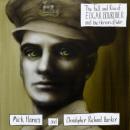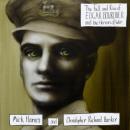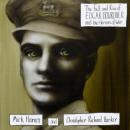"Bury me at midnight in a silver moonlight spray!
Bury me at midnight, like the beggar's writer, Gay!
Light a thousand torches, hire grieving widows by the yard!
Demand that the highest bishop admits to feeling sad!"
Such were the sentiments - oh, most comically expressed!
Of a young forgotten poet whose name you'll never guess
I thought it would be spiffing fine to have my grievers dine sublime
By candle-light, on coffin-top, reading out such rhymes!
(Chorus)
Dig, dig, dig-dig-dig, dig deeper than a well!
Dig, dig, dig-dig-dig, dig straight down to Hell!
Dig straight down and never stop, never stop that dig!
Dig straight down & burst right in, we'll have a manic jig!
Of course, Dear Reader, I know full well that this shall ne'er come to pass,
For who will be left to carry me home to such a moonlight mass?
There will be no pall-bearers left alive in this feeble quest for grass
And I shall lie where I shall die - in this maddening, grave-robbing farce!
So dig me a grave where I can rave and scribble for all time
Dig me a grave where I can vent articulate splenetic rhyme
Dig me a grave where I can nurture a hatred most sublime
For the fools who made this mess and think it not a crime!
(Chorus)
Dig, dig, dig-dig-dig, dig deeper than a well!
Dig, dig, dig-dig-dig, dig straight down to Hell!
Dig straight down and never stop, never stop that dig!
Dig straight down & burst right in, we'll have a manic jig!
A crime against the English, a crime against the Scots!
A crime against the Welsh but we all drew random lots
Random lots for where we’ll fall beneath this foreign sky
Random lots for body parts we’ll lose – an ear, a leg, an eye
Bury me at daybreak in a dull bleached ochre dawn !
Scrape up my body parts that decorate the War torn lawn!
Note my rank and number, take care to write it down
Then dig a hole, light a fag and lament a fallen clown!
(Chorus)
Dig, dig, dig-dig-dig, dig deeper than a well!
Dig, dig, dig-dig-dig, dig straight down to Hell!
Dig straight down and never stop, never stop that dig!
Dig straight down & burst right in, we'll have a manic jig!
Hell yeah!
Bury me at midnight, like the beggar's writer, Gay!
Light a thousand torches, hire grieving widows by the yard!
Demand that the highest bishop admits to feeling sad!"
Such were the sentiments - oh, most comically expressed!
Of a young forgotten poet whose name you'll never guess
I thought it would be spiffing fine to have my grievers dine sublime
By candle-light, on coffin-top, reading out such rhymes!
(Chorus)
Dig, dig, dig-dig-dig, dig deeper than a well!
Dig, dig, dig-dig-dig, dig straight down to Hell!
Dig straight down and never stop, never stop that dig!
Dig straight down & burst right in, we'll have a manic jig!
Of course, Dear Reader, I know full well that this shall ne'er come to pass,
For who will be left to carry me home to such a moonlight mass?
There will be no pall-bearers left alive in this feeble quest for grass
And I shall lie where I shall die - in this maddening, grave-robbing farce!
So dig me a grave where I can rave and scribble for all time
Dig me a grave where I can vent articulate splenetic rhyme
Dig me a grave where I can nurture a hatred most sublime
For the fools who made this mess and think it not a crime!
(Chorus)
Dig, dig, dig-dig-dig, dig deeper than a well!
Dig, dig, dig-dig-dig, dig straight down to Hell!
Dig straight down and never stop, never stop that dig!
Dig straight down & burst right in, we'll have a manic jig!
A crime against the English, a crime against the Scots!
A crime against the Welsh but we all drew random lots
Random lots for where we’ll fall beneath this foreign sky
Random lots for body parts we’ll lose – an ear, a leg, an eye
Bury me at daybreak in a dull bleached ochre dawn !
Scrape up my body parts that decorate the War torn lawn!
Note my rank and number, take care to write it down
Then dig a hole, light a fag and lament a fallen clown!
(Chorus)
Dig, dig, dig-dig-dig, dig deeper than a well!
Dig, dig, dig-dig-dig, dig straight down to Hell!
Dig straight down and never stop, never stop that dig!
Dig straight down & burst right in, we'll have a manic jig!
Hell yeah!
inviata da Dq82 - 5/12/2018 - 15:40
×
![]()









The Fall and Rise of Edgar Bourchier And the Horrors of War
La premessa è sufficiente a sgomberare il campo da ogni dubbio circa la levatura artistica di un musicista che, nonostante le notevoli prove d’autore fornite anche con la sua carriera solistica, è riuscito a rimanere, suo malgrado, sempre un po’ fuori dal circuito mainstream, in un’aura di marginalità nobile e per certi versi salvifica, che gli ha consentito di fare scelte creative talvolta ardite. Ne è la riprova questo suo ultimo, temerario lavoro, scritto a quattro mani con lo scrittore Christopher Richard Barker, per il quale ha musicato e interpretato le testimonianze immaginarie di un personaggio romanzato, il poeta di trincea Edgar Bourchier, che racconta in un variegato registro narrativo le efferatezze e le brutalità sul campo di battaglia della Prima Guerra Mondiale.
The Fall and Rise of Edgar Bourchier And the Horrors of War esce in occasione del centenario dell’Armistizio, e contiene in sé uno storytelling dall’approccio onnicomprensivo, che raccoglie frammenti multiformi di memorie immaginate, in cui entrano in gioco la paura, la giovinezza, la rabbia, la nostalgia, il senso d’inutilità. Dal punto di vista compositivo, è interessante constatare l’ambiziosa carrellata dei generi attraversati: dal folk tradizionale, che richiama un tempo perduto evocando strumenti antichi come le fisarmoniche, oltre all’inevitabile corredo di piani e chitarre acustiche (Pounding for Peace, The Poetic Clown), al post punk in pieno stile Birthday Party (Poor Por Surgeon Tim, The Expressionist #2, Corpse 564), sino alla dark wave vera e propria, con i sussurri di I Am The Messenger o The Lost Bastard Son of War, il cui riff pare emulare dichiaratamente She’s Lost Control dei Joy Division. Interessante anche l’esperimento di The Expressionist #1, dove una marcia militare e i cori che la scandiscono, sembrano voler diventare un ritmo punk.
In questo riuscito progetto atemporale, in cui sia la storia narrata che gli stili musicali richiamano il passato con un chiaro e costante riferimento al presente e una sapiente lettura contemporanea, troviamo il condensato di quello che dovrebbe essere un disco autoriale: una buona storia e un credibile incedere narrativo. Il messaggio è chiaro in tutto il suo ineluttabile pathos, eppure l’atmosfera in cui quel messaggio aleggia non appare mai enfatica e greve. Rischiava di essere un lavoro pretenzioso, è riuscito a non esserlo.
sentireascoltare.com